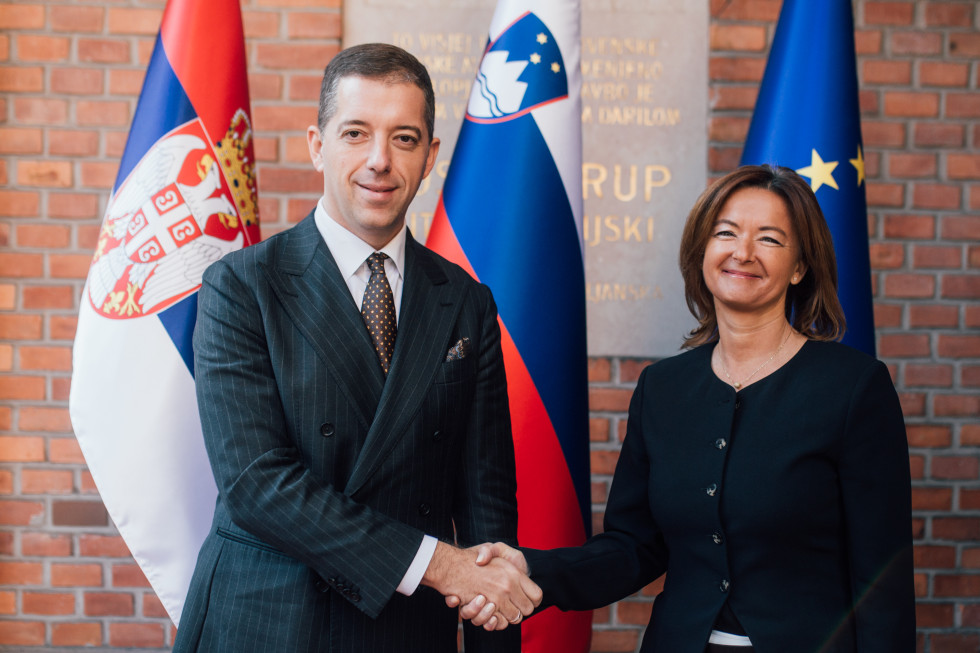Minister Tanja Fajon: I hope to see a positive step on Serbia's EU path this year

Minister Fajon warmly welcomes Serbian Foreign Minister Marko Đurić | Author Ministrstvo za zunanje in evropske zadeve
"Slovenians and Serbs have a lot in common," said Minister Fajon after her talks with Minister Đurić, recalling the outstanding Slovenians who have shaped and continue to shape life in Serbian society. "History has shown that we have always been able to overcome any disagreements and that our friendly relations have a solid foundation. Cooperation between Slovenia and Serbia is very dynamic and diverse. Our economic cooperation is on a positive trend. Trade in goods already exceeds €2 billion and there are some 1,500 Slovenian companies operating in Serbia, employing over 25,000 people. Minister Đurić and I agreed to intensify political consultations and hold a joint government meeting, and we also discussed the possibility of holding an investment forum and strengthening cooperation in science," she added.
The ministers devoted part of their talks to Serbia's progress towards the European Union. "Slovenia is a strong supporter of EU enlargement to the Western Balkans and to the east. Now is the right geostrategic moment to accelerate enlargement. We support Serbia's efforts in this direction and the opening of Cluster 3 (competitiveness and inclusive growth) under the Hungarian Presidency of the Council of the EU. I hope that this year we will see a positive step on Serbia's path towards the European Union," said Minister Fajon. Slovenia strongly supports Serbia's efforts to join the European Union and wants to see real progress in implementing the reforms that are a precondition for membership. In this context, she emphasised in particular the rule of law, the gradual alignment of foreign policy with the EU's Common Foreign and Security Policy and the normalisation of relations with Kosovo. The two ministers also agreed on the importance and weight of the enlargement portfolio assigned to Slovenia in the new European Commission.
They also discussed the outstanding issues of succession to the former Yugoslavia. Minister Fajon urged that, twenty years after the entry into force of the Agreement on Succession Issues, it was time to bring this issue to a successful conclusion. "The regular dialogue of the High Representatives on Succession Issues and the regular meetings of the Joint Committees under the annexes to the Agreement are key to actively resolving outstanding succession issues," Fajon stressed. She also exchanged views with Minister Đurić on how to resolve specific succession issues related to cultural heritage and archives.
Resolving the long-standing issue of normalisation of relations with Kosovo is crucial for the stability and progress in the Western Balkans. As Minister Fajon said, Slovenia is committed to the continuation of the Belgrade-Pristina dialogue. "We are following the situation in the north of Kosovo with concern and call for the situation to calm down and for all agreements reached in the dialogue to be implemented," said Minister Fajon.
The two ministers also discussed migration, in particular the situation on the Western Balkan route. Minister Fajon welcomed Serbia's signature of an agreement with Frontex, which is key in the fight against irregular migration.
On the sidelines of her meeting with Minister Đurić, Minister Fajon reiterated Slovenia's strong condemnation of the Russian aggression in Ukraine, its willingness to continue assisting Ukraine as long as necessary and its support for a lasting and just peace in Ukraine. On the Middle East conflict, she repeated her strong condemnation of the Israeli attack on the United Nations Interim Force in Lebanon (UNIFIL) and called for tougher sanctions against Israel, an immediate ceasefire, the release of hostages and the implementation of a two-state solution, including the recognition of Palestine.

